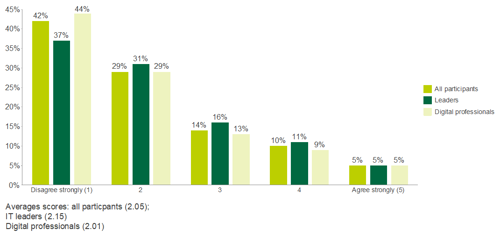Can the AI do everything?
Each year we ask a more contemporary question. This years’ was based on the interview between prime minister Rishi Sunak and Elon Musk. He said: 'There will come a point where no job is needed — you can have a job if you wanted to have a job ... personal satisfaction, but the AI will be able to do everything.'
Do our responders agree? The overall figures on agreement with this statement, where 1 is ‘disagree strongly’ and 5 is ‘agree strongly’ are as follows:
We used a large language model to analyse comments in answer to the question ‘will AI be able to do everything?’ Here are the main points extracted from the comments:
- Economic implications: There's a belief that unless we completely overhaul our economic system, people will still need jobs to afford essentials like food and housing. AI is not seen as capable of replacing all jobs, especially those requiring personal interaction such as nursing or teaching.
- Importance of human interaction: Many responses highlight the significance of human interaction in many jobs, which AI cannot replicate. Despite AI's growing capabilities, there will always be a need for physical human presence.
- Job creation vs. job displacement: Historically, technological advancements that create efficiencies and automate tasks have also led to the creation of new jobs. This pattern is expected to continue, suggesting that AI will change the job landscape rather than eliminate it entirely.
- Role of AI in decision support: In the near to medium-term, AI is expected to grow more in supporting decision-making roles, with humans remaining as the final decision-makers.
- Scepticism about AI replacing all jobs: There is scepticism about the idea that AI can replace all jobs, with some calling it scaremongering. Comments point out that politicians and public figures often lack a deep understanding of AI and its limitations.
- Technology shifting job roles: Historically, technology has shifted jobs from manual to skilled ones, and AI is expected to continue this trend, not necessarily eliminating jobs but changing their nature.
- Concerns about AI overreach: There's a fear that if AI develops beyond human intelligence, it may lead to a loss of control and potential societal upheaval due to the disparity between those who control AI and those who don't.
- AI as an augmentation tool: AI is viewed as a tool that could free up human resources to do more interesting work by taking away mundane tasks, rather than completely replacing human jobs.
- Societal and ethical concerns: The prospect of AI taking over jobs brings up societal and ethical concerns, including the potential loss of freedom, control, and choice on a societal level.
- AI's limitations and governance: There is a consensus that AI will have limitations and will require governance, including laws and treaties, particularly concerning its use in sensitive areas such as military applications.
- Elon Musk's comments on AI: Some responses specifically criticise Elon Musk's statements about AI, suggesting he lacks verifiable knowledge about the subject and caution against taking his predictions at face value.














